Backgrounder
20 Facts About Dogs & Dog-Eating in China
Yulin’s dog-eating festival has caused online outrage. But it is said that what dragon steak is in heaven, dog meat is on earth. Time for 20 facts about dogs and dog-eating in China.
Published
9 years agoon
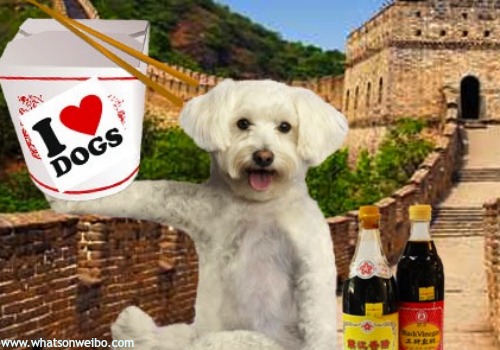
Yulin’s dog-eating festival has caused outrage, both within China as internationally. But it is said that what dragon steak is in heaven, dog meat is on earth. Time for 20 facts about dogs and dog-eating in China.
Over the past week, the Yulin Dog Meat Festival has been trending on China’s social media. The recurring festival, that is held in the south of China starting from June 21st celebrates the Summer Solstice by eating lychees and dog meat. Approximately 10,000 dogs are slaughtered during this festival; an abundance of food stalls in Yulin sell dog meat specialties.
Dog lovers and animal rights supporters have cried out against the event; many of them came to Yulin to protest against the practice of eating dog meat. Yulin locals resent these demonstrations and stand up for their legal right to eat dog meat. Online discussions have flared up in the light of this event, with strong sentiments against the eating of dog meat. Time to list some facts about dogs and dog eating in China.
1. The practice of dog eating is an ancient tradition. In China, it can be traced back to around 1700 B.C., starting in the north (Liu 2006, 102).
2. 13 to 16 million dogs are eaten in Asia on a yearly basis. Dog flesh can be found on the menu in North-Korea, South-Korea, Vietnam and China (Podberscek 2009, 616-617). (Image below: stew made of dog meat).
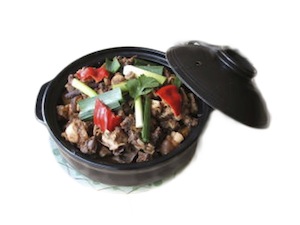
3. In ancient China, a dog could have three different functions within a household. It could be a watchdog (to guard the farmhouse), a hunting dog, or a dog that would be slaughtered to eat (Liu 2006).
4. Although dog-eating originally was a northern Chinese tradition, it was brought to the south around the 6th century. It became popularized due to northern nomadic groups that travelled south, bringing all kinds of customs with them – including dogs and their meat (Liu 2006,102).
5. The dog is one of China’s twelve zodiac signs. People who are born in the year of the dog are generally believed to be loyal, faithful and unselfish. They can also be pessimistic, anxious, and doubtful about many things in life.
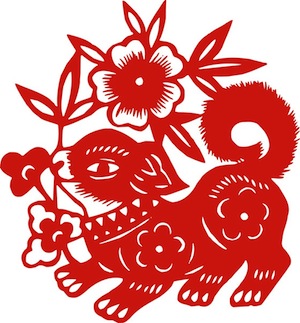
6. Dogs and dog meat were considered important offerings in ancient China. It was common that the deceased were buried together with their dog to accompany them to the other world. Dogs were also sacrificed as food for the gods (Liu 2006, 102-103). This shows that since ancient times, the dog was considered both a foodstuff and a friend in Chinese culture. (Image below: ceramic crouching dog, excavated from Henan burial site, dating from Han Dynasty, 206BC-220AD, Henan Museum).
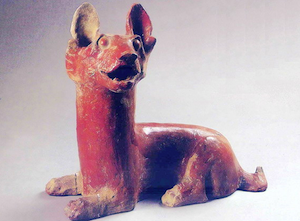
7. The importance of dogs in rituals of sacrifice is evident through Chinese scripture: the Chinese character for ‘offer’ (献, xian) incorporates the character for ‘dog’ (犬, quan) (Liu 2006, 102). (Image below: the character ‘xian’).
8. Around the 10th century, the meaning of dog meat started to change for many Chinese, who no longer perceived dogs as food. It is likely that the popularization of Buddhism caused this general change in attitude; Buddhism does not advocate the killing of any animals, but particularly rejects slaughtering dogs for their meat. Because of the dog’s general traits, such as loyalty to its owner, it came to be believed that killing dogs was bad karma (Liu 2006, 104).
9. Eating dog is considered taboo in Manchu culture. When the Manchu came to rule China from the 17th century, the eating of dog meat was labelled ‘barbarian’ and the practice was banned. Southern Chinese continued eating dog flesh (Hopkins 2004, 20).
10. Because followers of the Kuomintang (‘China’s National People’s Party’) were very much anti-Manchu, they symbolically would start their meetings by cooking dog meat (Hopkins 2004, 20).
11. Although dog eating has become relatively rare in China, the idea that dog meat is ‘tasty’ is ingrained in its culture and language. One famous saying goes: “Dragon meat in heaven, dog meat on earth” (天上龙肉,地上狗肉) (Liu 2006, 105).
12. Not long ago, dog flesh was also eaten in some parts of America, Africa and Europe. In Germany, dog meat was eaten until the early 20th century, and in 1996 it was still served in some areas in Switzerland. In the Phillippines, dog eating became illegal in 1998 (Podberscek 2009, 616-617; Roberts 2004, 20).
13. Today, dog meat is still mostly eaten in the south of China. Some say people in the south of China will eat almost anything. An old Chinese joke goes: “Anything with two legs is edible except your parents, so is anything with four legs, except the bed” (Yue 1999, 1).
14. Beijing currently still has 122 listed restaurants that serve dog meat or are specialized in it. (Image below: dog meat hanging outside a Beijing restaurant in 2009. Picture taken by author).
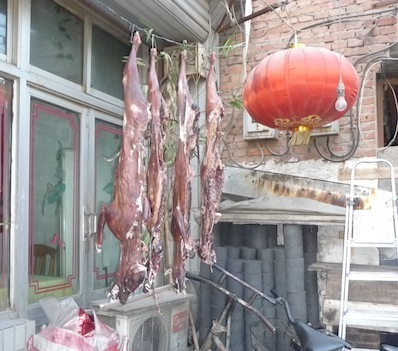
15. Dog meat is commonly praised for its good taste and health benefits. It is believed to be good for one’s ‘yang’, which stands for the hot (in contrast to the ‘ying’, which is cool). It is said to provide warmth in the winter and to have medicinal value. Not only is it presumed to be good for the liver; it supposedly also enhances the male sex drive (Roberts 2004, 20; Liu 2006; Hopkins 2004, 20). (Image below: dog meat hot pot).
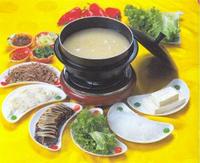
16. Although dogs were rarely seen in Chinese cities up to the late 1980s (Roberts 2004, 124), they have now become a popular pet. In China’s urban areas, one will often see dogs with colored tails or ears – a fashion trend.
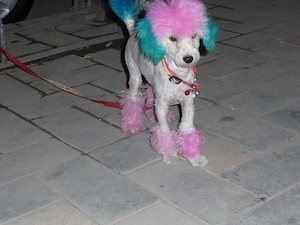
Photo by author.
17. In 2006, 50,000 dogs were beaten to death during a five day crackdown in Yunnan after three people died of rabies. Only 3% of China’s dogs are vaccinated against rabies, and 2000 people die because of it every year. During the Yunnan crackdown, authorities halted people who were walking their dog. The dogs were beaten to death on the spot (NBCN 2006).
18. In 2012, the city of Harbin issued a law banning 49 different breeds of larger dogs, including Golden Retrievers, Labradors and Chow Chows. If people had not disposed of their dogs by November 2012, they would be taken away by authorities. Weibo netizens collectively posted pictures of their dogs wearing an “SOS” sign as an outcry over the regulation (Ministry of Tofu 2012).
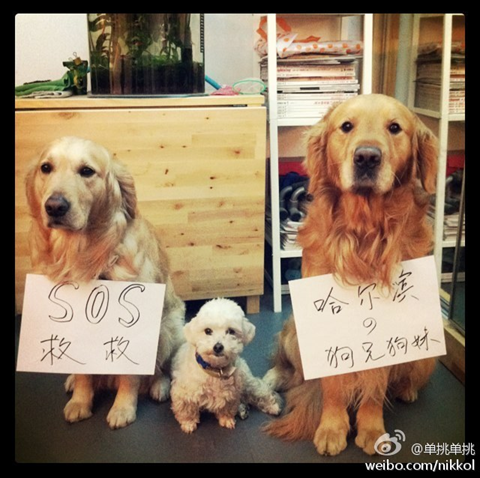
19. Eating dog flesh is only allowed in Mainland China; in Hong Kong, consuming dog meat has been illegal since 1954. In Taiwan, it was banned in 2001.
20. From shoes to dresses, from hats to sweatbands. You can find over 23,000 different items to dress and accessorize your dog when searching for dog’s clothing on China’s Taobao.
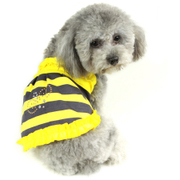
By Manya Koetse
Follow @WhatsOnWeibo
References
Hopkins, Jerry. 2004. Extreme Cuisine: The Weird & Wonderful Foods that People Eat. Singapore: Periplus.
Kaiman, Jonathan. 2014. “Chinese dog-eating festival backlash grows.” The Guardian. June 24 http://www.theguardian.com/world/2014/jun/23/chinese-dog-eating-festival-backlash-yulin-animal-rights (Accessed online June 24, 2014).
Liu Piaobing 刘朴兵. 2006. “Luelun Zhongguo Gudai de Shigou zhi Feng Ji Renmen dui Shiyong Gourou de Taidu 略论中国古代的食狗之风及人们对食用狗肉的态度 [A Discussion of China’s Ancient Dog Eating Practice and People’s Attitude Towards Eating Dog] (In Chinese). Yindu Xuekan 殷都学刊:102-106.
Ministry of Tofu. 2012. “Dog owners irate, tearful over Harbin’s crackdown on large dogs.” Ministry of Tofu. April 12 http://www.ministryoftofu.com/2012/04/dog-owners-irate-tearful-over-harbins-crackdown-on-large-dogs/ (Accessed June 23, 2014).
NBCN. 2006. “Chinese county clubs to death 50,000 dogs.” NBCN. August 1 http://www.nbcnews.com/id/14139027/ns/health-pet_health/t/chinese-county-clubs-death-dogs/#.U6rV142SzV5 (Accessed Online June 25, 2014).
Podberscek, Anthony. 2009. “Good to Pet and Eat: The Keeping and Consuming of Dogs and Cats in South Korea.” Journal of Social Issues 65(3): 615-632.
Roberts, J.A.G. 2004. China to Chinatown: Chinese Food in the West. Chicago: University of Chicago Press.
Young, Connie. 2014. “Canine controversy: Chinese festival serves up dog meat.” CNN. June 23 http://edition.cnn.com/2014/06/22/world/asia/china-yulin-dog-meat-festival/ (Accessed online June 24, 2014).
Yue Gang. 1999. The Mouth That Begs: Hunger, Cannibalism, and the Politics of Eating in Modern China. Durham & London: Duke University Press.
Images
ABC. 2013. http://www.abc.net.au/news/2013-04-29/seda-monastery2c-china/4657486.
BBC. 2009. http://news.bbc.co.uk/cbbcnews/hi/newsid_8150000/newsid_8150200/8150213.stm.
Henan Museum. http://www.chnmus.net/dcjp/node_4140.htm.
Manya Koetse is the founder and editor-in-chief of whatsonweibo.com. She is a writer, public speaker, and researcher (Sinologist, MPhil) on social trends, digital developments, and new media in an ever-changing China, with a focus on Chinese society, pop culture, and gender issues. She shares her love for hotpot on hotpotambassador.com. Contact at manya@whatsonweibo.com, or follow on Twitter.

Backgrounder
“Oppenheimer” in China: Highlighting the Story of Qian Xuesen
Qian Xuesen is a renowned Chinese scientist whose life shares remarkable parallels with Oppenheimer’s.
Published
10 months agoon
September 16, 2023By
Zilan Qian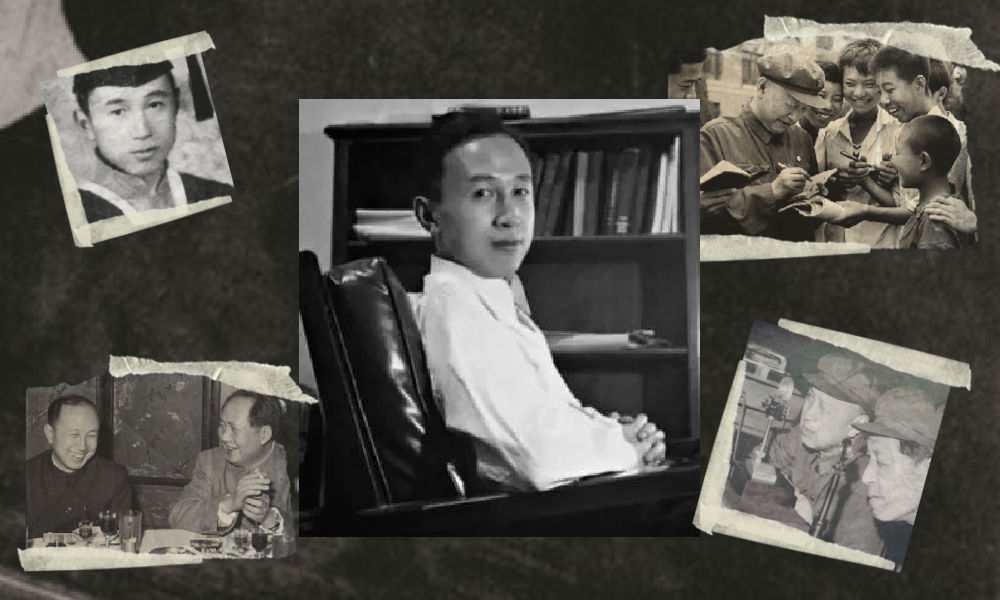
They shared the same campus, lived in the same era, and both played pivotal roles in shaping modern history while navigating the intricate interplay between science and politics. With the release of the “Oppenheimer” movie in China, the renowned Chinese scientist Qian Xuesen is being compared to the American J. Robert Oppenheimer.
In late August, the highly anticipated U.S. movie Oppenheimer finally premiered in China, shedding light on the life of the famous American theoretical physicist J. Robert Oppenheimer (1904-1967).
Besides igniting discussions about the life of this prominent scientist, the film has also reignited domestic media and public interest in Chinese scientists connected to Oppenheimer and nuclear physics.
There is one Chinese scientist whose life shares remarkable parallels with Oppenheimer’s. This is aerospace engineer and cyberneticist Qian Xuesen (钱学森, 1911-2009). Like Oppenheimer, he pursued his postgraduate studies overseas, taught at Caltech, and played a pivotal role during World War II for the US.
Qian Xuesen is so widely recognized in China that whenever I introduce myself there, I often clarify my last name by saying, “it’s the same Qian as Qian Xuesen’s,” to ensure that people get my name.
Some Chinese blogs recently compared the academic paths and scholarly contributions of the two scientists, while others highlighted the similarities in their political challenges, including the revocation of their security clearances.
The era of McCarthyism in the United States cast a shadow over Qian’s career, and, similar to Oppenheimer, he was branded as a “communist suspect.” Eventually, these political pressures forced him to return to China.
Although Qian’s return to China made his later life different from Oppenheimer’s, both scientists lived their lives navigating the complex dynamics between science and politics. Here, we provide a brief overview of the life and accomplishments of Qian Xuesen.
Departing: Going to America
Qian Xuesen (钱学森, also written as Hsue-Shen Tsien), often referred to as the “father of China’s missile and space program,” was born in Shanghai in 1911,1 a pivotal year marked by a historic revolution that brought an end to the imperial dynasty and gave rise to the Republic of China.
Much like Oppenheimer, who pursued further studies at Cambridge after completing his undergraduate education, Qian embarked on a journey to the United States following his bachelor’s studies at National Chiao Tung University (now Shanghai Jiao Tong University). He spent a year at Tsinghua University in preparation for his departure.
The year was 1935, during the eighth year of the Chinese Civil War and the fourth year of Japan’s invasion of China, setting the backdrop for his academic pursuits in a turbulent era.
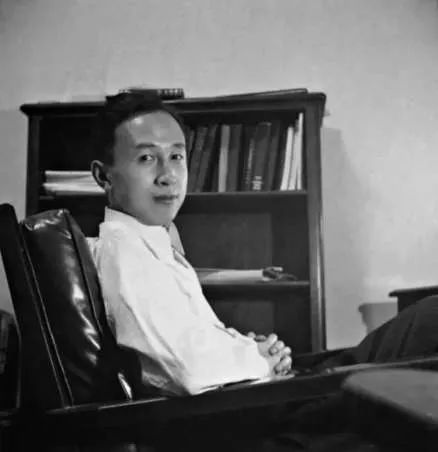
Qian in his office at Caltech (image source).
One year after arriving in the U.S., Qian earned his master’s degree in aeronautical engineering from the Massachusetts Institute of Technology (MIT). Three years later, in 1939, the 27-year-old Qian Xuesen completed his PhD at the California Institute of Technology (Caltech), the very institution where Oppenheimer had been welcomed in 1927. In 1943, Qian solidified his position in academia as an associate professor at Caltech. While at Caltech, Qian helped found NASA’s Jet Propulsion Laboratory.
When World War II began, while Oppenheimer was overseeing the Manhattan Project’s efforts to assist the U.S. in developing the atomic bomb, Qian actively supported the U.S. government. He served on the U.S. government’s Scientific Advisory Board and attained the rank of lieutenant colonel.

The first meeting of the US Department of the Air Force Scientific Advisory Board in 1946. The predecessor, the Scientific Advisory Group, was founded in 1944 to evaluate the aeronautical programs and facilities of the Axis powers of World War II. Qian can be seen standing in the back, the second on the left (image source).
After the war, Qian went to teach at MIT and returned to Caltech as a full-time professor in 1949. During that same year, Mao Zedong proclaimed the establishment of the People’s Republic of China (PRC). Just one year later, the newly-formed nation became involved in the Korean War, and China fought a bloody battle against the United States.
Red Scare: Being Labeled as a Communist
Robert Oppenheimer and Qian Xuesen both had an interest in Communism even prior to World War II, attending communist gatherings and showing sympathy towards the Communist cause.
Qian and Oppenheimer may have briefly met each other through their shared involvement in communist activities. During his time at Caltech, Qian secretly attended meetings with Frank Oppenheimer, the brother of J. Robert Oppenheimer (Monk 2013).
However, it was only after the war that their political leanings became a focal point for the FBI.
Just as the FBI accused Oppenheimer of being an agent of the Soviet Union, they quickly labeled Qian as a subversive communist, largely due to his Chinese heritage. While the government did not succeed in proving that Qian had communist ties with China during that period, they did ultimately succeed in portraying Qian as a communist affiliated with China a decade later.
During the transition from the 1940s to the 1950s, the Cold War was underway, and the anti-communist witch-hunts associated with the McCarthy era started to intensify (BBC 2020).
In 1950, the Korean War erupted, with the People’s Republic of China (PRC) joining North Korea in the conflict against South Korea, which received support from the United States. It was during this tumultuous period that the FBI officially accused Qian of communist sympathies in 1950, leading to the revocation of his security clearance despite objections from Qian’s colleagues. Four years later, in 1954, Robert Oppenheimer went through a similar process.
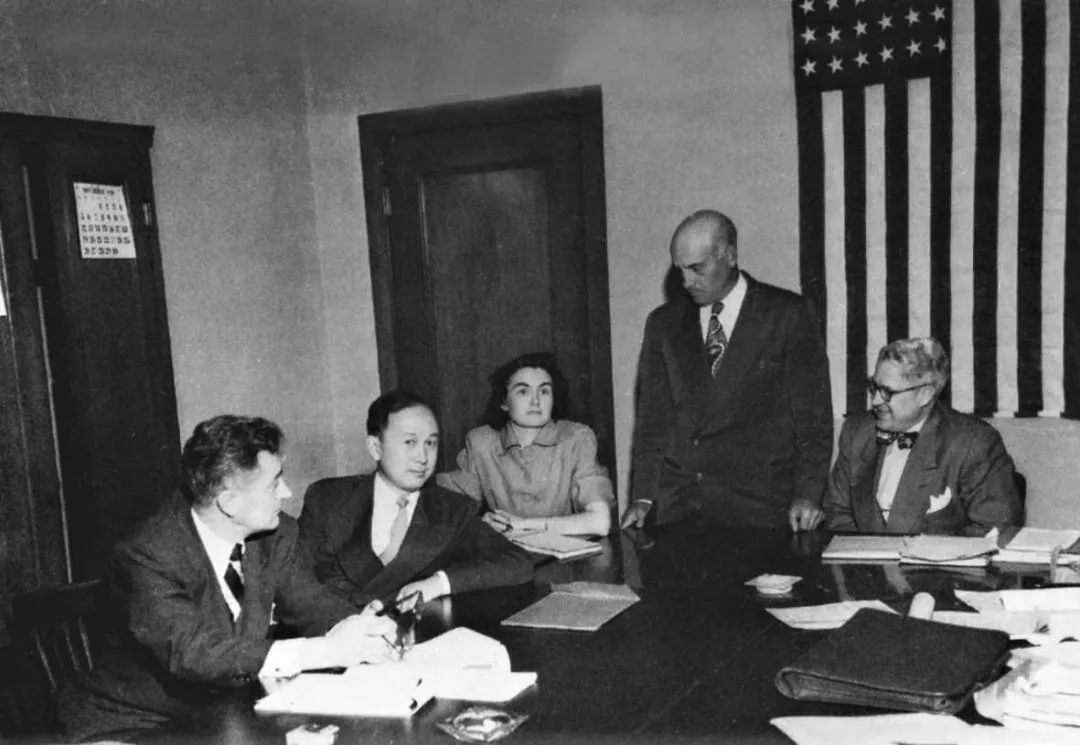
The 1950’s security hearing of Qian (second left). (Image source).
After losing his security clearance, Qian began to pack up, saying he wanted to visit his aging parents back home. Federal agents seized his luggage, which they claimed contained classified materials, and arrested him on suspicion of subversive activity. Although Qian denied any Communist leanings and rejected the accusation, he was detained by the government in California and spent the next five years under house arrest.
Five years later, in 1955, two years after the end of the Korean War, Qian was sent home to China as part of an apparent exchange for 11 American airmen who had been captured during the war. He told waiting reporters he “would never step foot in America again,” and he kept his promise (BBC 2020).
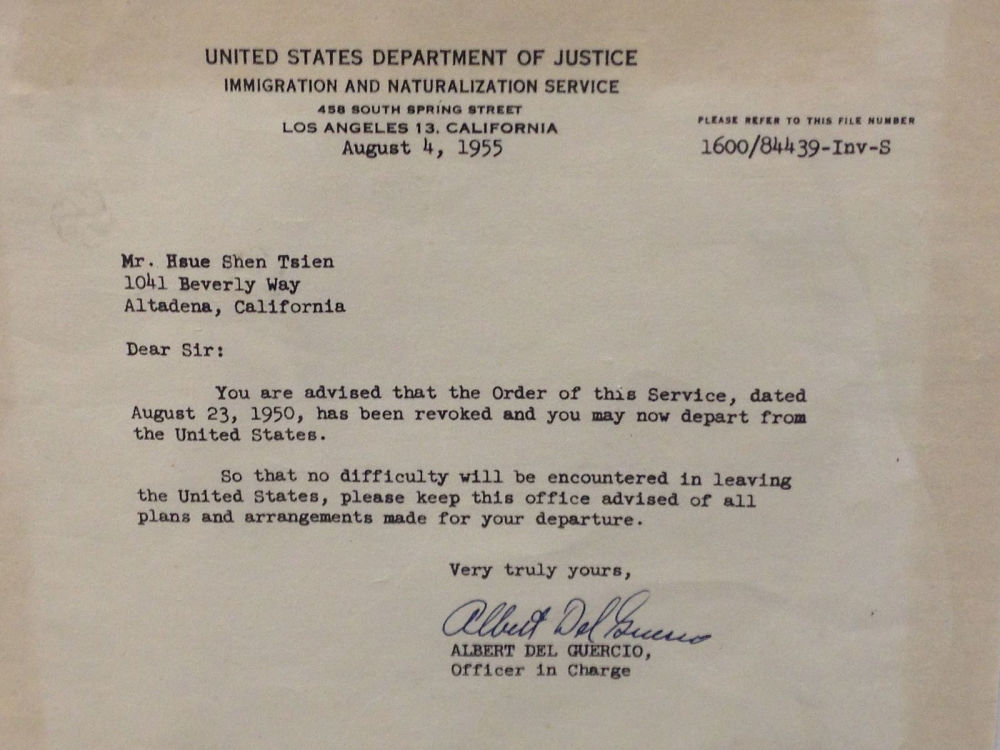
A letter from the US Immigration and Naturalization Service to Qian Xuesen, dated August 4, 1955, in which he was notified he was allowed to leave the US. The original copy is owned by Qian Xuesen Library of Shanghai Jiao Tong University, where the photo was taken. (Caption and image via wiki).
Dan Kimball, who was the Secretary of the US Navy at the time, expressed his regret about Qian’s departure, reportedly stating, “I’d rather shoot him dead than let him leave America. Wherever he goes, he equals five divisions.” He also stated: “It was the stupidest thing this country ever did. He was no more a communist than I was, and we forced him to go” (Perrett & Bradley, 2008).
Kimball may have foreseen the unfolding events accurately. After his return to China, Qian did indeed assume a pivotal role in enhancing China’s military capabilities, possibly surpassing the potency of five divisions. The missile programme that Qian helped develop in China resulted in weapons which were then fired back on America, including during the 1991 Gulf War (BBC 2020).
Returning: Becoming a National Hero
The China that Qian Xuesen had left behind was an entirely different China than the one he returned to. China, although having relatively few experts in the field, was embracing new possibilities and technologies related to rocketry and space exploration.
Within less than a month of his arrival, Qian was welcomed by the then Vice Prime Minister Chen Yi, and just four months later, he had the honor of meeting Chairman Mao himself.
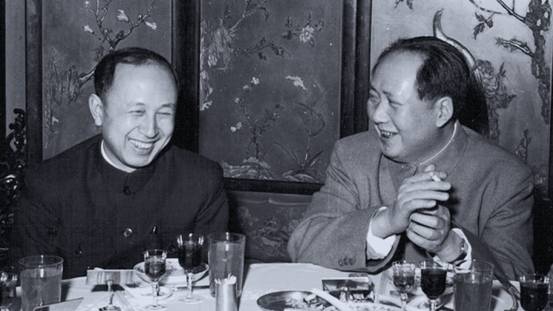
Qian and Mao (image source).
In China, Qian began a remarkably successful career in rocket science, with great support from the state. He not only assumed leadership but also earned the distinguished title of the “father” of the Chinese missile program, instrumental in equipping China with Dongfeng ballistic missiles, Silkworm anti-ship missiles, and Long March space rockets.
Additionally, his efforts laid the foundation for China’s contemporary surveillance system.
By now, Qian has become somewhat of a folk hero. His tale of returning to China despite being thwarted by the U.S. government has become like a legendary narrative in China: driven by unwavering patriotism, he willingly abandoned his overseas success, surmounted formidable challenges, and dedicated himself to his motherland.
Throughout his lifetime, Qian received numerous state medals in recognition of his work, establishing him as a nationally celebrated intellectual. From 1989 to 2001, the state-launched public movement “Learn from Qian Xuesen” was promoted throughout the country, and by 2001, when Qian turned 90, the national praise for him was on a similar level as that for Deng Xiaoping in the decade prior (Wang 2011).
Qian Xuesen remains a celebrated figure. On September 3rd of this year, a new “Qian Xuesen School” was established in Wenzhou, Zhejiang Province, becoming the sixth high school bearing the scientist’s name since the founding of the first one only a year ago.
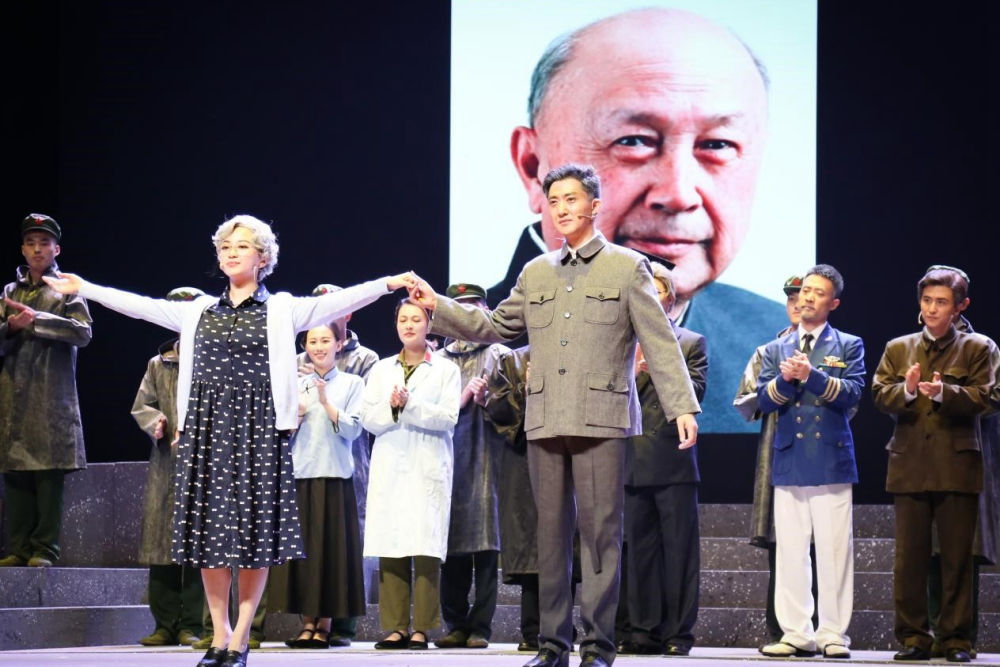
In 2017, the play “Qian Xuesen” was performed at Qian’s alma mater, Shanghai Jiaotong University. (Image source.)
Qian Xuesen’s legacy extends well beyond educational institutions. His name frequently appears in the media, including online articles, books, and other publications. There is the Qian Xuesen Library and a museum in Shanghai, containing over 70,000 artefacts related to him. Qian’s life story has also been the inspiration for a theater production and a 2012 movie titled Hsue-Shen Tsien (钱学森).2
Unanswered Questions
As is often the case when people are turned into heroes, some part of the stories are left behind while others are highlighted. This holds true for both Robert Oppenheimer and Qian Xuesen.
The Communist Party of China hailed Qian as a folk hero, aligning with their vision of a strong, patriotic nation. Many Chinese narratives avoid the debate over whether Qian’s return was linked to problems and accusations in the U.S., rather than genuine loyalty to his homeland.
In contrast, some international media have depicted Qian as a “political opportunist” who returned to China due to disillusionment with the U.S., also highlighting his criticism of “revisionist” colleagues during the Cultural Revolution and his denunciation of the 1989 student demonstrations.
Unlike the image of a resolute loyalist favored by the Chinese public, Qian’s political ideology was, in fact, not consistently aligned, and there were instances where he may have prioritized opportunity over loyalty at different stages of his life.
Qian also did not necessarily aspire to be a “flawless hero.” Upon returning to China, he declined all offers to have his biography written for him and refrained from sharing personal information with the media. Consequently, very little is known about his personal life, leaving many questions about the motivations driving him, and his true political inclinations.

The marriage photo of Qian and Jiang. (Image source).
We do know that Qian’s wife, Jiang Ying (蒋英), had a remarkable background. She was of Chinese-Japanese mixed race and was the daughter of a prominent military strategist associated with Chiang Kai-shek. Jiang Ying was also an accomplished opera singer and later became a professor of music and opera at the Central Conservatory of Music in Beijing.
Just as with Qian, there remain numerous unanswered questions surrounding Oppenheimer, including the extent of his communist sympathies and whether these sympathies indirectly assisted the Soviet Union during the Cold War.
Perhaps both scientists never imagined they would face these questions when they first decided to study physics. After all, they were scientists, not the heroes that some narratives portray them to be.
Also read:
■ Farewell to a Self-Taught Master: Remembering China’s Colorful, Bold, and Iconic Artist Huang Yongyu
■ “His Name Was Mao Anying”: Renewed Remembrance of Mao Zedong’s Son on Chinese Social Media
By Zilan Qian
Follow @whatsonweibo
1 Some sources claim that Qian was born in Hangzhou, while others say he was born in Shanghai with ancestral roots in Hangzhou.
2The Chinese character 钱 is typically romanized as “Qian” in Pinyin. However, “Tsien” is a romanization in Wu Chinese, which corresponds to the dialect spoken in the region where Qian Xuesen and his family have ancestral roots.
This article has been edited for clarity by Manya Koetse
References (other sources hyperlinked in text)
BBC. 2020. “Qian Xuesen: The man the US deported – who then helped China into space.” BBC.com, 27 October https://www.bbc.com/news/stories-54695598 [9.16.23].
Monk, Ray. 2013. Robert Oppenheimer: A Life inside the Center, First American Edition. New York: Doubleday.
Perrett, Bradley, and James R. Asker. 2008. “Person of the Year: Qian Xuesen.” Aviation Week and Space Technology 168 (1): 57-61.
Wang, Ning. 2011. “The Making of an Intellectual Hero: Chinese Narratives of Qian Xuesen.” The China Quarterly, 206, 352-371. doi:10.1017/S0305741011000300
Get the story behind the hashtag. Subscribe to What’s on Weibo here to receive our newsletter and get access to our latest articles:
Spotted a mistake or want to add something? Please let us know in comments below or email us. First-time commenters, please be patient – we will have to manually approve your comment before it appears.
©2023 Whatsonweibo. All rights reserved. Do not reproduce our content without permission – you can contact us at info@whatsonweibo.com.
Backgrounder
Farewell to a Self-Taught Master: Remembering China’s Colorful, Bold, and Iconic Artist Huang Yongyu
Renowned Chinese artist and the creator of the ‘Blue Rabbit’ zodiac stamp Huang Yongyu has passed away at the age of 98. “I’m not afraid to die. If I’m dead, you may tickle me and see if I smile.”
Published
1 year agoon
June 15, 2023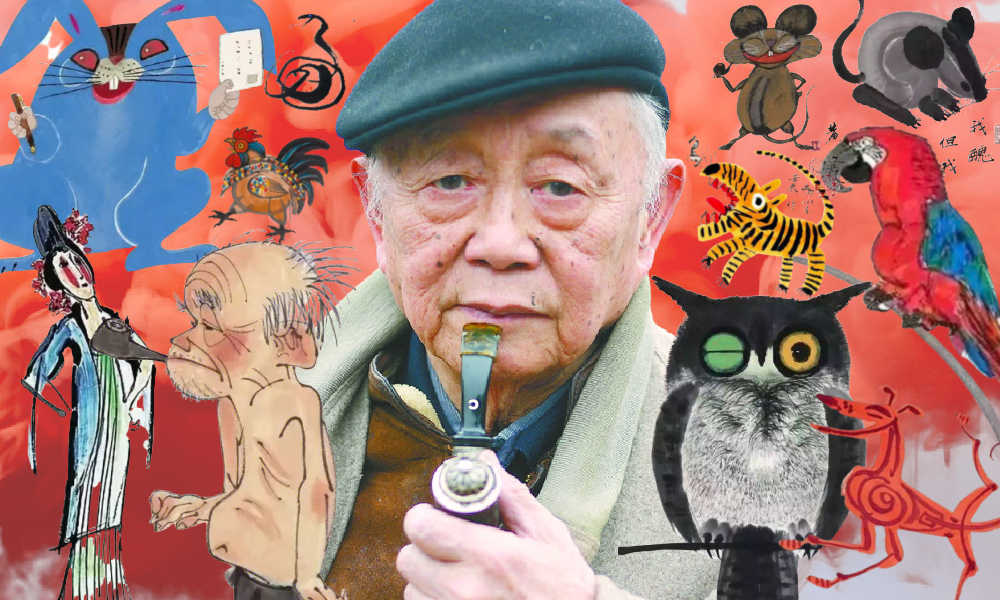
The famous Chinese painter, satirical poet, and cartoonist Huang Yongyu has passed away. Born in 1924, Huang endured war and hardship, yet never lost his zest for life. When his creativity was hindered and his work was suppressed during politically tumultuous times, he remained resilient and increased “the fun of living” by making his world more colorful.
He was a youthful optimist at old age, and will now be remembered as an immortal legend. The renowned Chinese painter and stamp designer Huang Yongyu (黄永玉) passed away on June 13 at the age of 98. His departure garnered significant attention on Chinese social media platforms this week.
On Weibo, the hashtag “Huang Yongyu Passed Away” (#黄永玉逝世#) received over 160 million views by Wednesday evening.
Huang was a member of the China National Academy of Painting (中国国家画院) as well as a Professor at the Central Academy of Fine Arts (中央美术学院).
Huang Yongyu is widely recognized in China for his notable contribution to stamp design, particularly for his iconic creation of the monkey stamp in 1980. Although he designed a second monkey stamp in 2016, the 1980 stamp holds significant historical importance as it marked the commencement of China Post’s annual tradition of releasing zodiac stamps, which have since become highly regarded and collectible items.
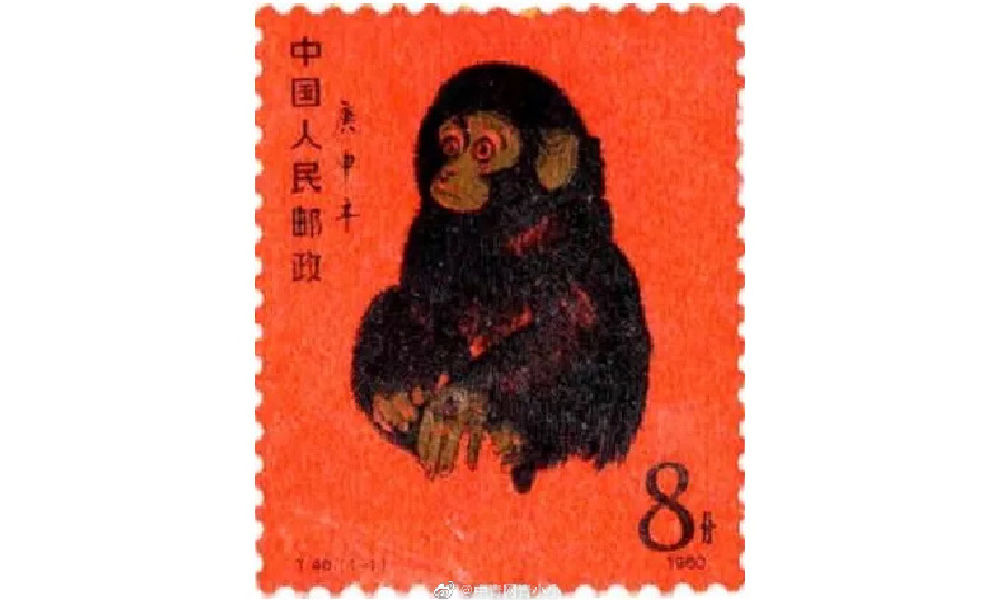
Huang’s famous money stamp that was issued by China Post in 1980.
The monkey stamp designed by Huang Yongyu has become a cherished collector’s item, even outside of China. On online marketplaces like eBay, individual stamps from this series are being sold for approximately $2000 these days.
Huang Yongyu’s latest most famous stamp was this year’s China Post zodiac stamp. The stamp, a blue rabbit with red eyes, caused some online commotion as many people thought it looked “horrific.”
Some thought the red-eyed blue rabbit looked like a rat. Others thought it looked “evil” or “monster-like.” There were also those who wondered if the blue rabbit looked so wild because it just caught Covid.
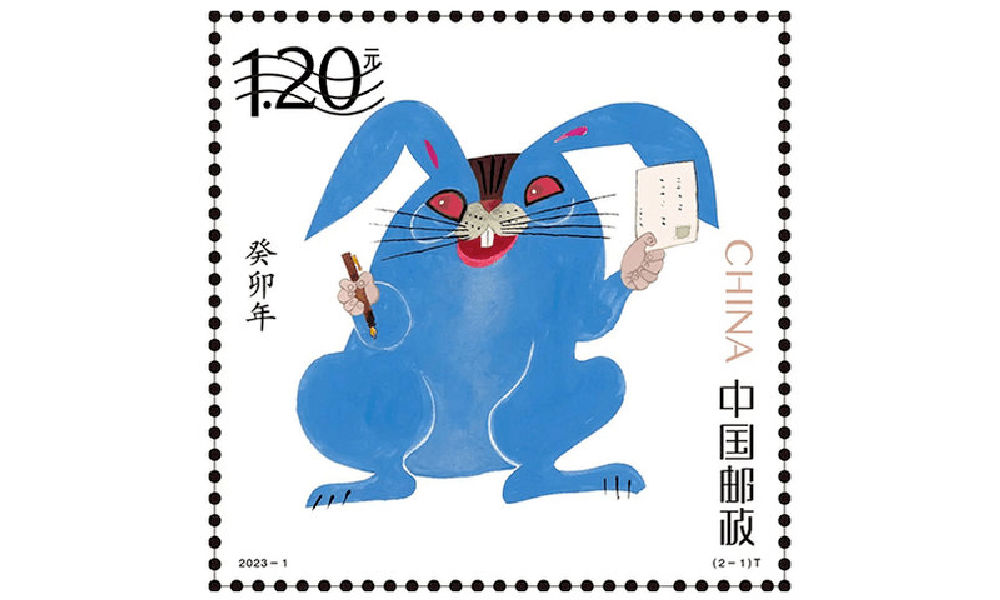
Huang’s (in)famous blue rabbit stamp.
Nevertheless, many people lined up at post offices for the stamps and they immediately sold out.
In light of the controversy, Huang Yongyu spoke about the stamps in a livestream in January of 2023. The 98-year-old artist claimed he had simply drawn the rabbit to spread joy and celebrate the new year, stating, “Painting a rabbit stamp is a happy thing. Everyone could draw my rabbit. It’s not like I’m the only one who can draw this.”
Huang’s response also went viral, with one Weibo hashtag dedicated to the topic receiving over 12 million views (#蓝兔邮票设计者直播回应争议#) at the time. Those defending Huang emphasized how it was precisely his playful, light, and unique approach to art that has made Huang’s work so famous.
A Self-Made Artist
“I’m ugly, but my mum likes me”
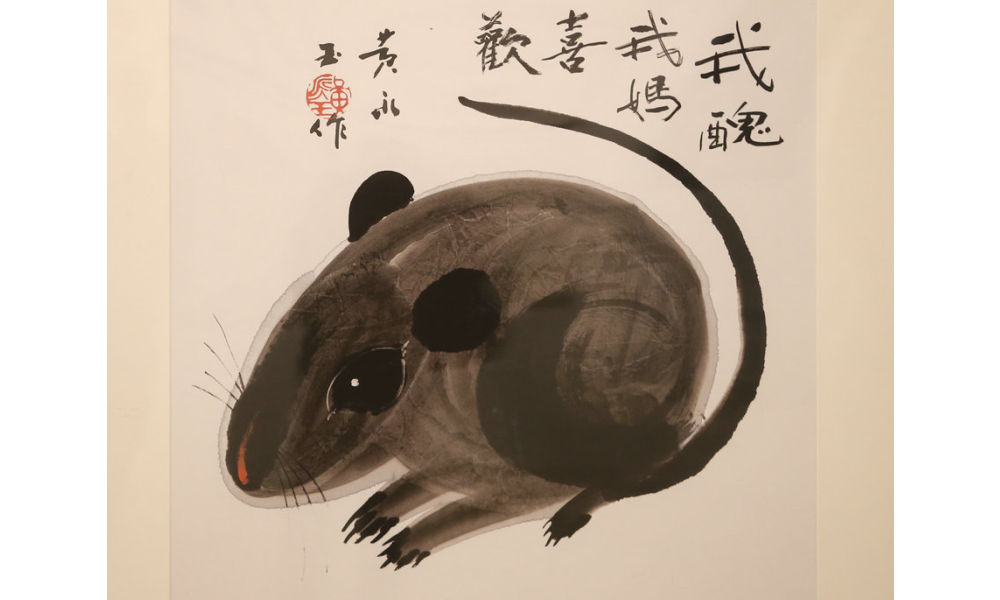
‘Ugly Mouse’ by Huang Yongyu [Image via China Daily].
Huang Yongyu was born on August 9, 1924, in Hunan’s Chengde as a native of the Tujia ethnic group.
He was born into an extraordinary family. His grandfather, Huang Jingming (黄镜铭), worked for Xiong Xiling (熊希齡), who would become the Premier of the Republic of China. His first cousin and lifelong friend was the famous Chinese novelist Shen Congwen (沈从文). Huang’s father studied music and art and was good at drawing and playing the accordion. His mother graduated from the Second Provincial Normal School and was the first woman in her county to cut her hair short and wear a short skirt (CCTV).
Born in times of unrest and poverty, Huang never went to college and was sent away to live with relatives at the age of 13. His father would die shortly after, depriving him of a final goodbye. Huang started working in various places and regions, from porcelain workshops in Dehua to artisans’ spaces in Quanzhou. At the age of 16, Huang was already earning a living as a painter and woodcutter, showcasing his talents and setting the foundation for his future artistic pursuits.
When he was 22, Huang married his first girlfriend Zhang Meixi (张梅溪), a general’s daughter, with whom he shared a love for animals. He confessed his love for her when they both found themselves in a bomb shelter after an air-raid alarm.
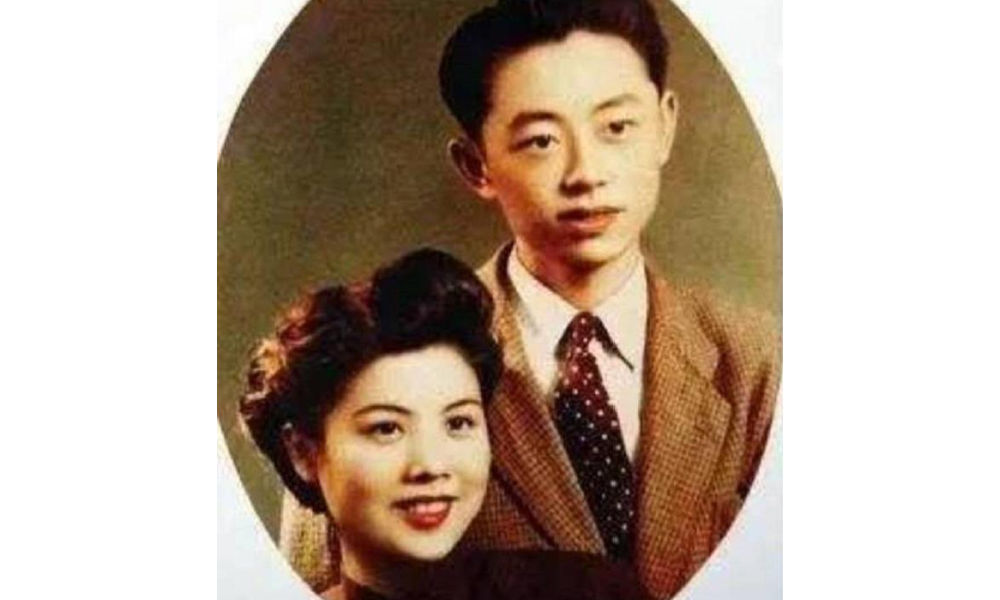
Huang and Zhang Meixi [163.com]
In his twenties, Huang Yongyu emerged as a sought-after artist in Hong Kong, where he had relocated in 1948 to evade persecution for his left-wing activities. Despite achieving success there, he heeded Shen Congwen’s advice in 1953 and moved to Beijing. Accompanied by his wife and their 7-month-old child, Huang took on a teaching position at the esteemed Central Academy of Fine Arts (中央美术学院).
The couple raised all kinds of animals at their Beijing home, from dogs and owls to turkeys and sika deers, and even monkeys and bears (Baike).
Throughout Huang’s career, animals played a significant role, not only reflecting his youthful spirit but also serving as vehicles for conveying satirical messages.
One recurring motif in his artwork was the incorporation of mice. In one of his famous works, a grey mouse is accompanied by the phrase ‘I’m ugly, but my mum likes me’ (‘我丑,但我妈喜欢’), reinforcing the notion that regardless of our outward appearance or circumstances, we remain beloved children in the eyes of our mothers.
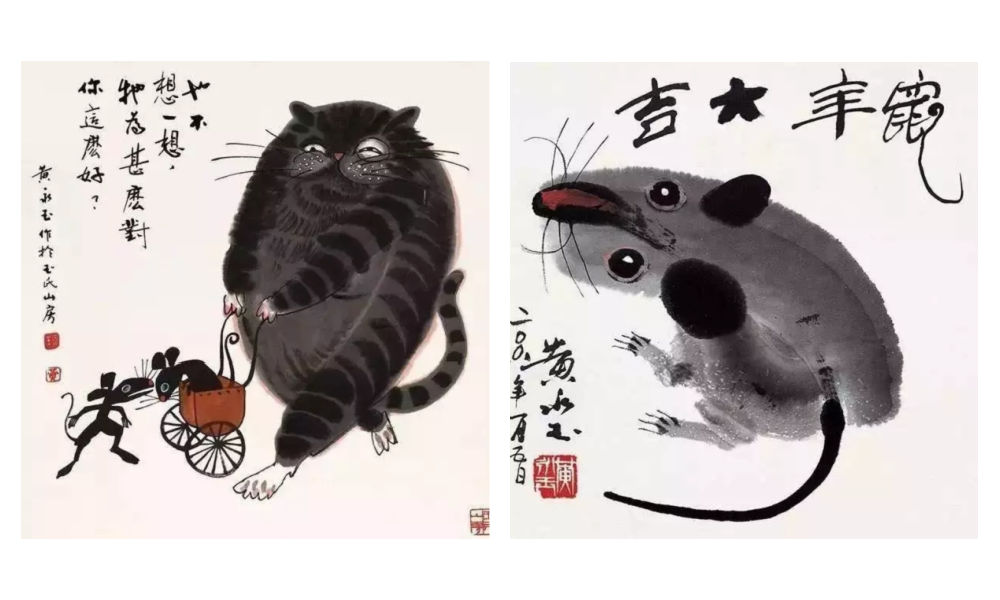
As a teacher, Huang liked to keep his lessons open-minded and he, who refused to join the Party himself, stressed the importance of art over politics. He would hold “no shirt parties” in which his all-male studio students would paint in an atmosphere of openness and camaraderie during hot summer nights (Andrews 1994, 221; Hawks 2017, 99).
By 1962, creativity in the classroom was limited and there were far more restrictions to what could and could not be created, said, and taught.
Bright Colors in Dark Times
“Strengthen my resolve and increase the fun of living”
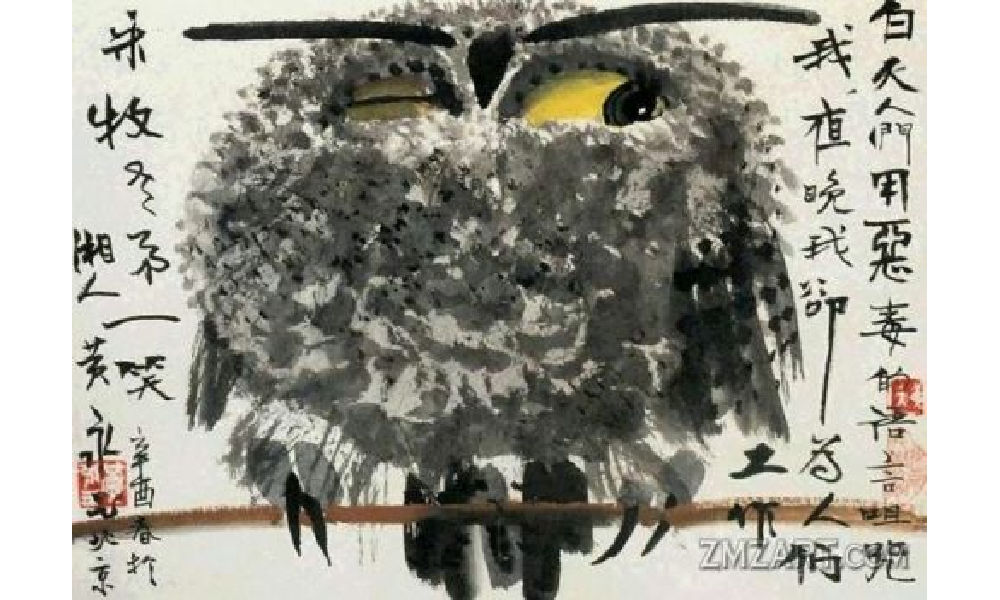
Huang Yongyu’s winking owl, 1973, via Wikiart.
In 1963, Huang was sent to the countryside as part of the “Four Cleanups” movement (四清运动, 1963-1966). Although Huang cooperated with the requirement to attend political meetings and do farm work, he distanced himself from attempts to reform his thinking. In his own time, and even during political meetings, he would continue to compose satirical and humorous pictures and captions centered around animals, which would later turn into his ‘A Can of Worms’ series (Hawks 2017, 99; see Morningsun.org).
Three years later, at the beginning of the Cultural Revolution, many Chinese major artists, including Huang, were detained in makeshift jails called ‘niupeng‘ (牛棚), cowsheds. Huang’s work was declared to be counter-revolutionary, and he was denounced and severely beaten. Despite the difficult circumstances, Huang’s humor and kindness would remind his fellow artist prisoners of the joy of daily living (2017, 95-96).
After his release, Huang and his family were relocated to a cramped room on the outskirts of Beijing. The authorities, thinking they could thwart his artistic pursuits, provided him with a shed that had only one window, which faced a neighbor’s wall. However, this limitation didn’t deter Huang. Instead, he ingeniously utilized vibrant pigments that shone brightly even in the dimly lit space.
During this time, he also decided to make himself an “extra window” by creating an oil painting titled “Eternal Window” (永远的窗户). Huang later explained that the flower blossoms in the paining were also intended to “strengthen my resolve and increase the fun of living” (Hawks 2017, 4; 100-101).
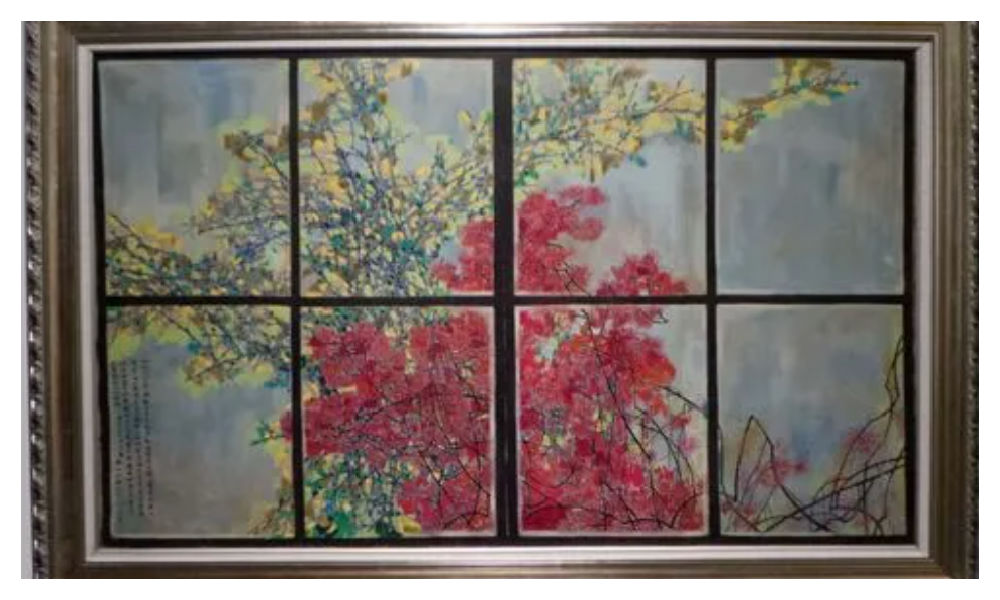
Huang Yongyu’s Eternal Window [Baidu].
In 1973, during the peak of the Cultural Revolution, Huang painted his famous winking owl. The calligraphy next to the owl reads: “During the day people curse me with vile words, but at night I work for them” (“白天人们用恶毒的语言诅咒我,夜晚我为他们工作”) (Matthysen 2021, 165).
The painting was seen as a display of animosity towards the regime, and Huang got in trouble for it. Later on in his career, however, Huang would continue to paint owls. In 1977, when the Cultural Revolution had ended, Huang Yongyu painted other owls to ridicules his former critics (2021, 174).
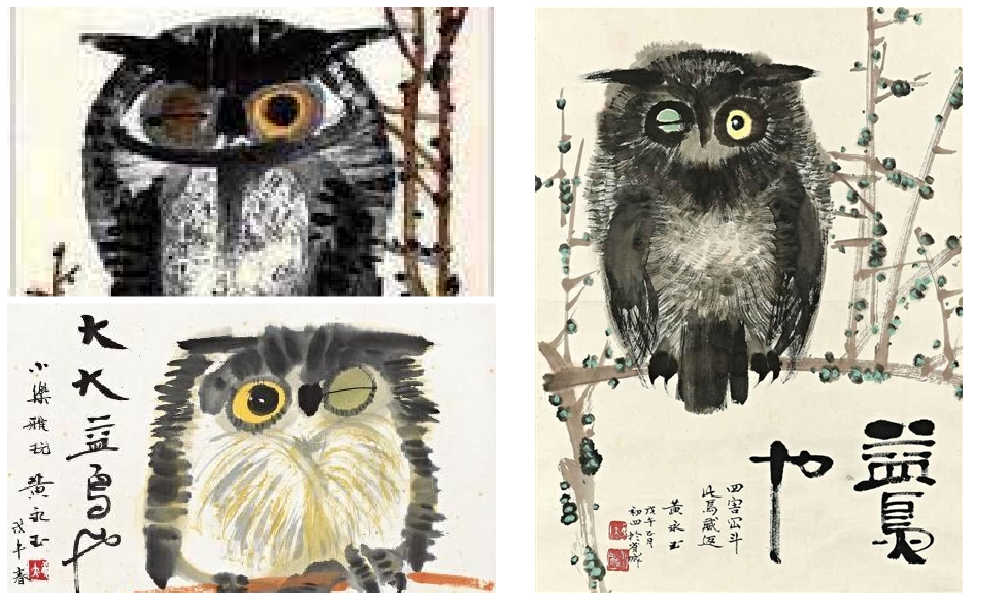
According to art scholar Shelly Drake Hawks, Huang Yongyu employed animals in his artwork to satirize the realities of life under socialism. This approach can be loosely compared to George Orwell’s famous novel Animal Farm.
However, Huang’s artistic style, vibrant personal life, and boundary-pushing work ethic also draw parallels to Picasso. Like Picasso, Huang embraced a colorful life, adopted an innovative approach to art, and challenged artistic norms.
An Optimist Despite All Hardships
“Quickly come praise me, while I’m still alive”
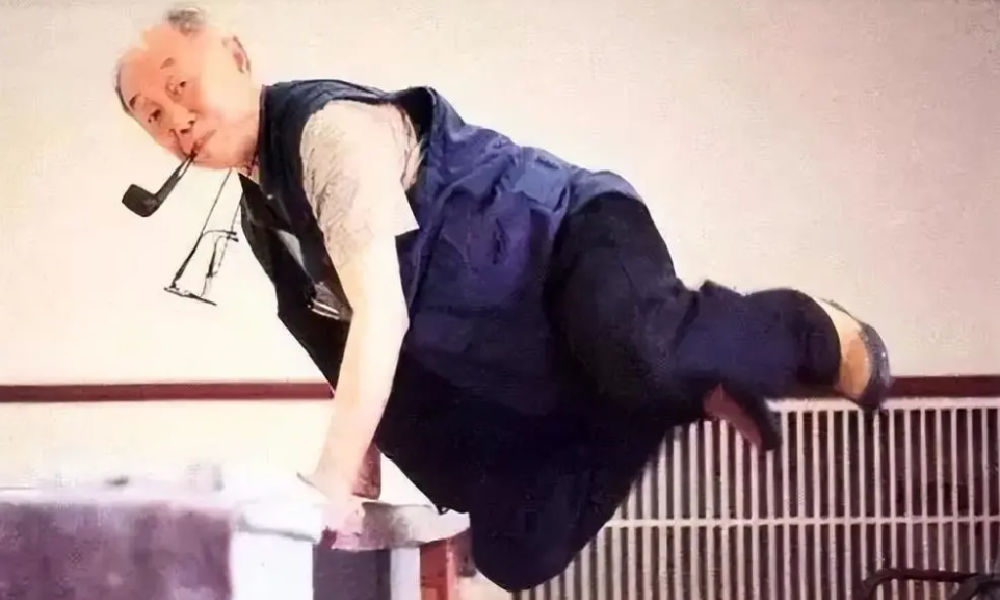
Huang Yongyu will be remembered in China with love and affection for numerous reasons. Whether it is his distinctive artwork, his mischievous smile and trademark pipe, his unwavering determination to follow his own path despite the authorities’ expectations, or his enduring love for his wife of over 75 years, there are countless aspects to appreciate and admire about Huang.
One things that is certainly admirable is how he was able to maintain a youthful and joyful attitude after suffering many hardships and losing so many friends.
“An intriguing soul. Too wonderful to describe,” one Weibo commenter wrote about Huang, sharing pictures of Huang Yongyu’s “Scenes of Pooping” (出恭图) work.
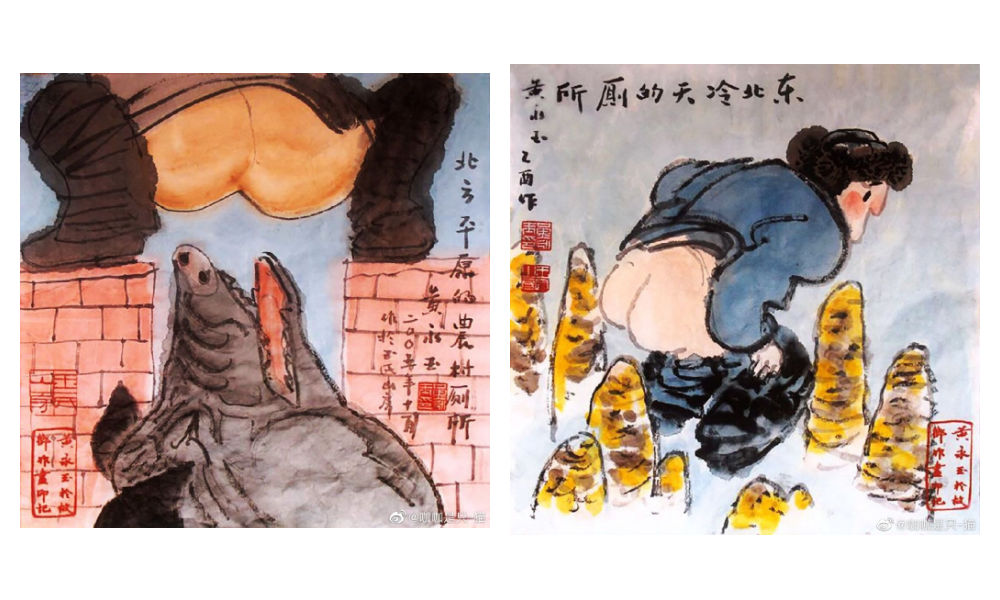
Old age did not hold him back. At the age of 70, his paintings sold for millions. When he was in his eighties, he was featured on the cover of Esquire (时尚先生) magazine.
At the age of 82, he stirred controversy in Hong Kong with his “Adam and Eve” sculpture featuring male and female genitalia, leading to complaints from some viewers. When confronted with the backlash, Huang answered, “I just wanted to have a taste of being sued, and see how the government would react” (Ora Ora).
I'm guessing the 98-year-old Huang loved the controversy. When confronted with backlash for his sculpture featuring male and female genitalia in 2007 Hong Kong, Huang answered, "I just wanted to have a taste of being sued, and see how the government would react." pic.twitter.com/kG0MVVM4SN
— Manya Koetse (@manyapan) June 15, 2023
In his nineties, he started driving a Ferrari. He owned mansions in his hometown in Hunan, in Beijing, in Hong Kong, and in Italy – all designed by himself (Chen 2019).
Huang kept working and creating until the end of his life. “It’s good to work diligently. Your work may be meaningful. Maybe it won’t be. Don’t insist on life being particularly meaningful. If it’s happy and interesting, then that’s great enough.”
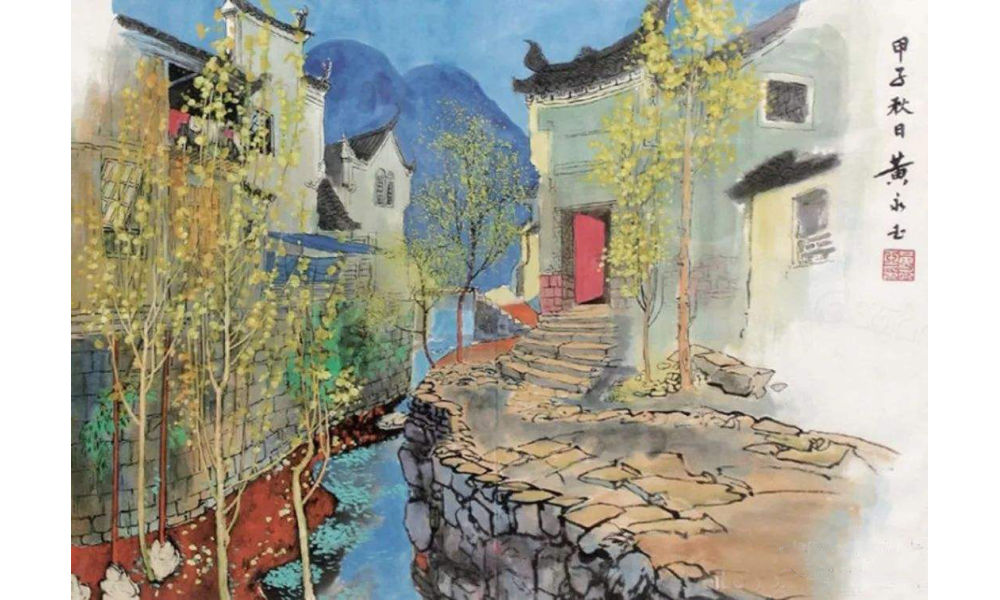
“Hometown Scenery” or rather “Hunan Scenery” (湘西风景) by Huang.
Huang did not dread the end of his life.
“My old friends have all died, I’m the only one left,” he said at the age of 95. He wrote his will early and decided he wanted a memorial service for himself before his final departure. “Quickly come praise me, while I’m still alive,” he said, envisioning himself reclining on a chair in the center of the room, “listening to how everyone applauds me” (CCTV, Sohu).
He stated: “I don’t fear death at all. I always joke that when I die, you should tickle me first and see if I’ll smile” (“对死我是一点也不畏惧,我开玩笑,我等死了之后先胳肢我一下,看我笑不笑”).

Huang with Yiwo (伊喔), the original model for the monkey stamp [Shanghai Observer].
Huang also was not sentimental about what should happen to his ashes. In a 2019 article in Guangming Daily, it was revealed that he suggested to his wife the idea of pouring his ashes into the toilet and flushing them away with the water.
However, his wife playfully retorted, saying, “No, that won’t do. Your life has been too challenging; you would clog the toilet.”
To this, Huang responded, “Then wrap my ashes into dumplings and let everyone [at the funeral] eat them, so you can tell them, ‘You’ve consumed Huang Yongyu’s ashes!'”
But she also opposed of that idea, saying that they would vomit and curse him forever.
Nevertheless, his wife expressed opposition to this idea, citing concerns that it would cause people to vomit and curse him indefinitely.
In response, Huang declared, “Then let’s forget about my ashes. If you miss me after I’m gone, just look up at the sky and the clouds.” Eventually, his wife would pass away before him, in 2020, at the age of 98, having spent 77 years together with Huang.
Huang will surely be missed. Not just by the loved ones he leaves behind, but also by millions of his fans and admirers in China and beyond.
“We will cherish your memory, Mr. Huang,” one Weibo blogger wrote. Others honor Huang by sharing some of his famous quotes, such as, “Sincerity is more important than skill, which is why birds will always sing better than humans” (“真挚比技巧重要,所以鸟总比人唱得好”).
Among thousands of other comments, another social media user bid farewell to Huang Yongyu: “Our fascinating Master has transcended. He is now a fascinating soul. We will fondly remember you.”
By Manya Koetse
Get the story behind the hashtag. Subscribe to What’s on Weibo here to receive our newsletter and get access to our latest articles:
References
Andrews, Julia Frances. 1994. Painters and Politics in the People’s Republic of China, 1949-1979. Berkley: University of California Press.
Baike. “Huang Yongyu 黄永玉.” Baidu Baike https://baike.baidu.com/item/%E9%BB%84%E6%B0%B8%E7%8E%89/1501951 [June 14, 2023].
CCTV. 2023. “Why Everyone Loves Huang Yongyu [为什么人人都爱黄永玉].” WeChat 央视网 June 14.
Chen Hongbiao 陈洪标. 2019. “Most Spicy Artist: Featured in a Magazine at 80, Flirting with Lin Qingxia at 91, Playing with Cars at 95, Wants Memorial Service While Still Alive [最骚画家:80岁上杂志,91岁撩林青霞,95岁玩车,活着想开追悼会].” Sohu/Guangming Daily March 16: https://www.sohu.com/a/301686701_819105 [June 15, 2023].
Hawks, Shelley Drake. 2017. The Art of Resistance Painting by Candlelight in Mao’s China. Seattle: University of Washington Press.
Matthysen, Mieke. 2021. Ignorance is Bliss: The Chinese Art of Not Knowing. Palgrave Macmillan.
Ora Ora. “HUANG YONGYU 黃永玉.” Ora Ora https://www.ora-ora.com/artists/103-huang-yongyu/ [June 15, 2023].
Spotted a mistake or want to add something? Please let us know in comments below or email us. First-time commenters, please be patient – we will have to manually approve your comment before it appears.
©2023 Whatsonweibo. All rights reserved. Do not reproduce our content without permission – you can contact us at info@whatsonweibo.com.
Subscribe

Weibo Watch: The Future is Here

“Bye Bye Biden”: Biden’s Many Nicknames in Chinese

Enjoying the ‘Sea’ in Beijing’s Ditan Park

A Triumph for “Comrade Trump”: Chinese Social Media Reactions to Trump Rally Shooting

Weibo Watch: Get Up, Stand Up

The Tragic Story of “Fat Cat”: How a Chinese Gamer’s Suicide Went Viral

“Old Bull Eating Young Grass”: 86-Year-Old Chinese Painter Fan Zeng Marries 36-Year-Old Xu Meng

A Brew of Controversy: Lu Xun and LELECHA’s ‘Smoky’ Oolong Tea

Singing Competition or Patriotic Fight? Hunan TV’s ‘Singer 2024’ Stirs Nationalistic Sentiments

Zara Dress Goes Viral in China for Resemblance to Haidilao Apron

Weibo Watch: The Battle for the Bottom Bed

About the “AI Chatbot Based on Xi Jinping” Story

China’s Intensified Social Media Propaganda: “Taiwan Must Return to Motherland”

Weibo Watch: Telling China’s Stories Wrong

Saying Goodbye to “Uncle Wang”: Wang Wenbin Becomes Chinese Ambassador to Cambodia
Get in touch
Would you like to become a contributor, or do you have any tips or suggestions? Get in touch here!
Popular Reads
-

 China Insight3 months ago
China Insight3 months agoThe Tragic Story of “Fat Cat”: How a Chinese Gamer’s Suicide Went Viral
-

 China Music4 months ago
China Music4 months agoThe Chinese Viral TikTok Song Explained (No, It’s Not About Samsung)
-

 China Digital10 months ago
China Digital10 months agoToo Sexy for Weibo? Online Discussions on the Concept of ‘Cābiān’
-

 China Arts & Entertainment12 months ago
China Arts & Entertainment12 months agoBehind 8 Billion Streams: Who is Dao Lang Cursing in the Chinese Hit Song ‘Luocha Kingdom’?

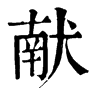
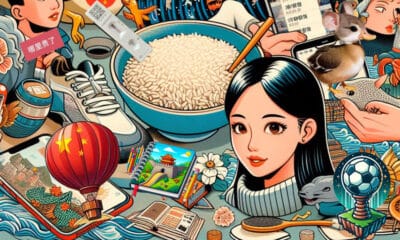

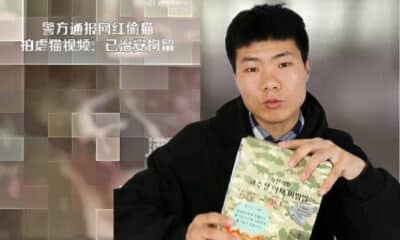




sharon rowe
August 25, 2016 at 6:13 pm
you forget to mention the barbaric and unecessary torture of dogs for the meat…that is what the West is outraged about, not the eating of dogs. there is not defence, it makes you look like savages when we see pictures of Chinese people boiling a dog alive and it makes a lot of us hate China for turning a blind eye to it.
Zur
October 28, 2016 at 1:03 pm
Sharon Rowe — Excellent observation on the author’s oversight and how very convenient! Without a doubt, one of the most disgusting and despicable traditional customs of Asian and African countries! Damn those who introduced dogs to that part of the world! 🙁
Angelo
May 22, 2017 at 11:03 pm
God..if you believe in that. Sure, different breeds were introduced but dogs were kinda everywhere ???? you stupi
Nancy
January 30, 2020 at 2:52 pm
you are absolutely right !! Anyone who has a conscience it churns to see any animal in pain or torutured. Dogs especially are so important to us humans, they serve so many functions for us, not to mention companionship. You can only hurt an animals or anything if you don’t have a conscience!
That should worry the world. !!!Dogs are protectors, companions, search dogs, military dogs, even as specimens in labs, but shouldnt be. Many humans cannot perform what a dog does!!
God Bless all the animals, especially dogs! We will all pay for our indifference!!
Troy
January 9, 2017 at 3:42 am
I could be wrong, but this ‘article’ smells of sponsorship, and cover-ups.
Manya Koetse
January 16, 2017 at 4:28 pm
Dear Troy, What’s on Weibo is not sponsored, you are right that you are wrong in that regard.
Cheryl Henriksen
March 22, 2017 at 2:35 am
EXACTLY!!!!
indra
April 12, 2017 at 4:12 am
.l.
Angelo
May 22, 2017 at 11:08 pm
He used the word sacrifice. Only you would see that and forget what a sacrifice REALLY looks like. Dogs arentry sheep and China isn’t Pakistan. Different rituals different ways and according to which animal…a sacrifice can be quiet and less VISUALLY brutal or it can be nightmare inducing. You not agreeing with it does nothing to change their beliefs. Kinda like that whole Christianity thing. Not agreeing doesn’t change their beliefs
Mindy Rutkovitz
May 4, 2018 at 1:06 pm
The asian countries that slaughter and eat dog meat on a large scale claim to do it because it is such an important part of their culture when in reality it is all money driven. Yes, dogs have been eaten in rare and limited circumstances throughout history and around the world, but the practice does not compare with what is going on now with literally millions of dogs being brutalized in both life and death.
And the constant comparison of dogs to other domesticated animals is ridiculous. Asians use this reasoning to intimate western racism and certain westerners who want to seem in the know with eastern culture come to their defense. The truth is that dogs hold an extremely important position in human culture. They were never domesticated to be a primary food source. They have been companions to human beings for centuries and have helped us to survive and create our way of life. We would not be as successful a species as we are without them. There is no other domesticated mammal, including the cat, with whom we have such a symbiotic relationship. They work for and with us all of the time and
in exchange have been given high status among us. Eating dogs is a form of cannibalism. That is why the aura of taboo hangs over the consumption of dog meat even where the practice is common.
The widespread practice of consuming dog meat in some asian nations is an aberration that has become culturally acceptable. Its appeal is its decadence and the money to be made off of it. Look at all of those tourists who come to the Yulin festival to spice up their boring, middle class existences. Asia has a lot more interesting, relevant and healthy culture to share with the world. I don’t know why some cling to this as a matter of pride.